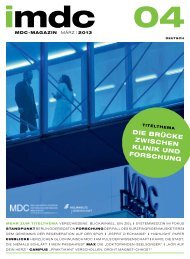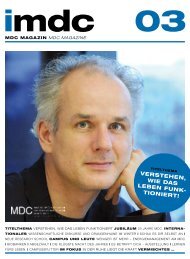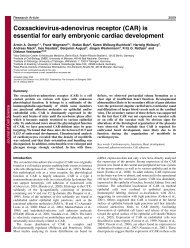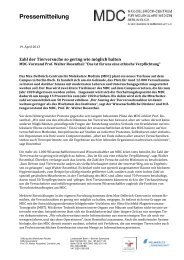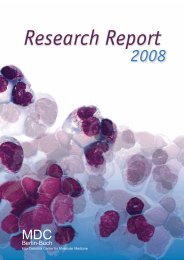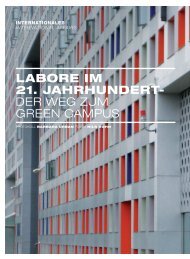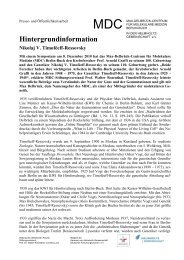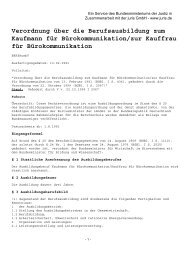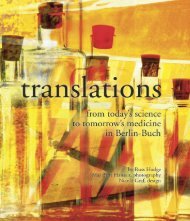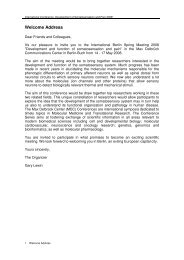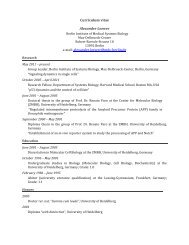iMDC03 zum Download (pdf)
iMDC03 zum Download (pdf)
iMDC03 zum Download (pdf)
Erfolgreiche ePaper selbst erstellen
Machen Sie aus Ihren PDF Publikationen ein blätterbares Flipbook mit unserer einzigartigen Google optimierten e-Paper Software.
approaches that seem promising. That‘s<br />
the case with inhibitors targeting<br />
the epidermal growth factor receptor<br />
(EGFR), known to promote tumor<br />
growth. “So far the results have been<br />
disappointing compared to chemotherapy,“<br />
Fichtner says. “Studies of our<br />
model animals have revealed some of<br />
the ways cancer cells circumvent the<br />
inhibitors‘ effects.“<br />
Patients as integral<br />
partners in research<br />
Ideally, a cancer patient‘s tumor<br />
falls into a known category that<br />
responds well to an existing treatment.<br />
How many categories are there, what<br />
factors influence tumor development,<br />
and how will a specific patient<br />
respond? Obtaining answers will almost<br />
surely require vast Biobanks and the<br />
type of pipeline that Fichtner and her<br />
colleagues have worked so long to<br />
establish.<br />
But all of this work depends on<br />
obtaining samples, so a major effort<br />
is underway to tell patients why the<br />
procedure is important and how their<br />
privacy will be protected. Patients<br />
shouldn‘t withhold consent for the<br />
wrong reasons, researchers believe,<br />
particularly since every existing<br />
treatment stems from a long history<br />
of others who have been willing to<br />
share tissues and information.<br />
Samples are already routinely collected<br />
during surgery; extra tissue that isn‘t<br />
preserved will simply be destroyed, and<br />
a potential wealth of information is<br />
lost forever.<br />
The effort to educate patients<br />
seems to be paying off; most patients<br />
consent. The growing Tumor Biobank<br />
has already attracted research collaboration<br />
partners from Berlin, Germany,<br />
and abroad. “Anybody who has an idea<br />
and obtained the necessary ethical<br />
approval can work with us,“ Esmeralda<br />
Heiden says.<br />
Setting up the pipeline from the<br />
Biobanks to mice and back to patients<br />
has been complicated. But once in<br />
place, as this unique project at the<br />
MDC and the Charité shows, it may go<br />
a long way toward achieving the goals<br />
of translational research and making<br />
personalized medicine a reality.<br />
CaMpus anD people<br />
Marlen Keil in the lab<br />
imdc03 2012<br />
55



